Monarch of Gods and Dæmons, and all Spirits
But One, who throng those bright and rolling worlds
Which Thou and I alone of living things
Behold with sleepless eyes! regard this Earth
Made multitudinous with thy slaves, whom thou
Requitest for knee-worship, prayer, and praise,
And toil, and hecatombs of broken hearts,
With fear and self-contempt and barren hope.
Whilst me, who am thy foe, eyeless in hate,
Hast thou made reign and triumph, to thy scorn,
O’er mine own misery and thy vain revenge. ( Shelley, Prometheus Unbound )
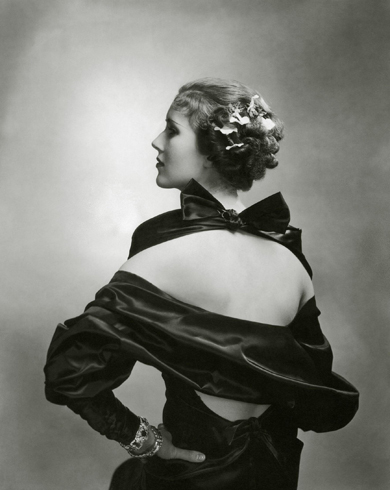
Edward Steichen. The faustian leitmotif of the eternal feminine...drumming out the hexameter's beat on Faustina's back that Goethe was introduced to the erotic world Faust encounters in Helen of Troy
Today we call the romantic era a time in history a “period,” as if it were behind us. In fact, the romantic era never ended. Our own celebration and denigration of stardom descends directly from the movement that began before 1800. And with it the discovery of death, romance, light, passion, roast game birds, love, peril, beauty, pleasure, art, the natives, happiness, and everything else: by the nineteenth century Romantics. Sometimes the form may be more enduringly real than the living…

In 1845 when Joseph Severn portrayed Shelley "composing Prometheus Unbound in the baths of Carcalla," the poet had already been dead some twenty years, and his Italian adventures had taken on mythic proportions.
For the funeral pyre of a romantic poet, there could hardly have been a more propitious setting. In the foreground, a vast expanse of blue and windless Mediterranean wit the islands of Elba and Gorgona visible on the horizon. The coast, descending from a range of white marble mountains, was a stretch of sandy wilderness tufted with underbrush. Here, at the edge of the bay of Lerici, at four in the afternoon of August, 27,1822, a fire was built to consume the earthly remains of the greatest lyric poet of the age.
…Celebrity, the industrialization of fame, now fills so much conversation and so much journalism that sometimes it almost seems our generation invented the whole business. In fact, it’s already older by two centuries than the oldest humans alive; but even so, in the catalogue of civilizations it remains relatively new.
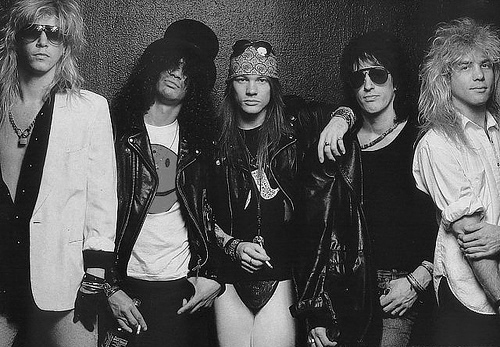
" As the band continued to sell millions of LPs, and sell-out concert stadiums, rumors of turmoil in the band and substance abuse began to swirl. Stradlin stirred up controversy when he urinated in an airplane galley and verbally abused a stewardess."
Celebrity was invented near the end of the eighteenth century, when the romantic movement focussed public attention on a freshly invented creature: the artist-genius.They were replacemenst for the relatively anonymous culture-workers who had made the world’s art for thousands of years. Lord Byron, Richard Wagner, Charles Dickens, Victor Hugo and perhaps a dozen other stars emerged over the next century as larger-than-life personalities, people of unique talent who could not be ignored. Why did this phenomenon appear and take root in human life? Does it fill a need? Why do we require, in steadily larger quantities, something the Romans or the Elizabethans did without? …
“You can have no idea.” wrote Byron, the principal mourner,”what an extraordinary effect such a funeral pile has, on a desolate shore, with mountains in the background and the sea before, and the singular appearance of the salt and frankincense gave to the flame. …” At Byron’s side was the “pirate” E.J. Trelawney, and Shelley’s cousin, Thomas Medwin; and, slumped in a nearby carriage, unable to face the scene , was that unhappy man of letters, Leigh Hunt, who had arrived in Italy only a few weeks before and was now in a state of nervous prostration. Byron’s nerves, too, were overwrought: taking off his clothes, he plunged into the sea- the same treacherous blue waters that had claimed his friend,s life- and swam to his yacht anchored offshore.

Ron Mueck. "Mask II"...He will watch from dawn to gloom …Nor heed, nor see, what things they be; But from these create he can Forms more real than living man… – Percy Bysshe Shelley, “Prometheus Unbound”
What Byron evidently had in mind was a ganges-like immersion to refresh the body and restore the spirit. Symbolically, it was a tribute to the great mother Mediterranean who had brought both Byron and Shelley to this siren shore, and to whom both had dedicated the
t years of their poetry: the poet is dead; long live the ) long-distance-swimming) poet!It appears we cannot voyage deep into this sphere of history without encountering questions of personal morality. Byron was mad, bad and dangerous to know, as one of his lovers famously said. No doubt his example helped encourage the now well-established belief that celebrity carries privileges unavailable to ordinary humans. Most of us would feel some shame or slight remorse if we destroyed a motel room in a drunken frenzy, or urinate in the aisle of an airplane on a commercial flight; certain rock musicians consider an incident like that more or less part of the game, — and usually get away with it.
Leo Tolstoy carelessly impregnated a serf on his estate, then expected his young wife to accept as a matter of course the presence of the illegitimate son. He showed no more restraint, until, late in life, when he became religious than the coke-driven moral cretins who populate Entourage, the TV program about amoral Hollywood actors and their despicable agents. Tolstoy was among the most celebrated of celebrities. As James Meek recently remarked in the London Review of Books, his fame at the end of his life was far greater than we can imagine even now: “It was as if Picasso, after painting Guernica, had mutated into Gandhi, without losing any of his artistic reputation.” As with Hollywood stars of today, he took pleasure in spreading his often dubious and ill-informed opinions….
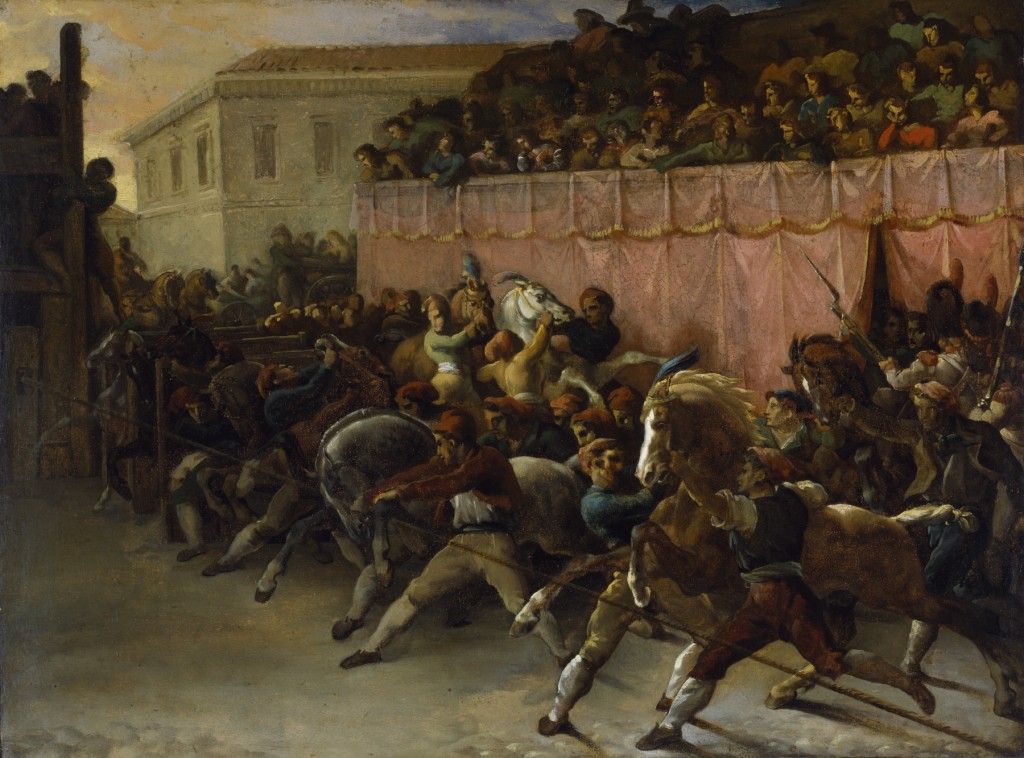
" It is evening, and the setting sun illuminates the banks of spectators in the stalls. While studying in Rome in 1817, Géricault witnessed the "corsa dei barberi." To prepare for a monumental painting recording the spectacle, Géricault executed some oil sketches. In this study, showing the grooms struggling to hold the horses at the starting line on the Via del Corso, he presents the most literal rendition of the event. In other versions, he sets the race in ancient rather than contemporary Rome."
If the Mediterranean had not already existed, the romantics would have had to invent one. As it was, they discovered it anew and made it a focal point of European art, literature and music. They may not have been model tourists , but they made certain that everyone would remember their travels in the land of the lemon orchard and the olive grove: Goethe, wandering among the mountains of Sicily; Stendhal , star gazing at La Scala; Turner, discovering the dazzling quality of light in Venice; Chopin, writing his Raindrop Prelude during a storm on Majorca; Delacroix on the Barbary Coast, Chateaubriand in the Holy Land, Mérimée in Andalusia… the whole cultural topography of Europe suddenly tilted south.

Goethe in Italy. They were not the first artists from the North to make this pilgrimmage: Milton, Durer, handel and Mozart were among their predecessors. But the romantics were the first to roam the region more or less at will, without having to rely on the patronage or protection of a great prince.
It was like a second Renaissance or a latter day Crusade in which the romantics enlisted, not to conquer but to be conquered, not to convert but to be converted. ” Only in Rome did I learn what it actually means to be a human being,” Goethe admitted in later years. “I never again rose to such heights, to such joys of consciousness; compared to what I felt in Rome. I was never really happy again.” Though some of the less lucky ones, like Keats, came only in time to die, this was the kind of elemental experience that the mediterranean could be counted on to provide; it was a place for insights and turning points.
… Fred Inglis in his “A Short History of Celebrity” emphasizes the ambivalence of our feelings toward celebrities and the attitudes that arise from those feelings. We love them passionately, but envy them, too; its a precarious co-existence. They are disposable and there seems to be no shortage, and if there is more can be manufactured. And, as Inglis says, “Envy is a tense, psychotic passion. It revolves through desire to fulfilment to disappointment to dislike. The great satisfaction is to see those who are enviable humiliated. This is a primary rhythm of celebrity.” Gossip and scandal, he says, “fill the entrails of the audience with brief satisfaction.” Algernon Swinburne had a phrase for it: “The unconscious malevolence of self-righteousness.” …
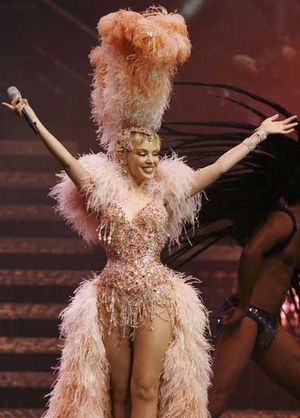
David Goldblatt:Byron demonstrated the importance of charm as a public value, the potency of scandal in shaping and sustaining fame, and helped create a world where life becomes synonymous with an artist's work and a belief that art feeds directly off public excesses. But Byron, of course, was more than mere scandal. For celebrity and fame to be disengaged from mere art required the invention of conspicuous status-driven consumption and public forms of leisure. These were, in part, the creations of 19th-century Paris, where the department stores functioned as the stage for the rich and famous, and of 20th-century America, where the super-rich and their new-found fortunes became the cornerstone of fame and glamour.
Here, in the Mediterranean sunlight, Géricault and Corot began their private revolutions in painting. Here Stendhal first sensed that “happiness is contagious” in a realm where “nature rules supreme,” and that his destiny lay in “la chasse au bonheur”, the pursuit of happiness. Here, in about a year’s time, Berlioz found the background material for virtually all the major works he was to compose for the rest of his life. Here, Flaubert experienced “the beginning of this nameless something” that was to be his life as a writer.
In the century in which privilege gave way to talent, the artist could exercise his geographic as well as social mobility. The golden age of Mediterranean tourism is at hand; the roads are becoming passable; even the poorer poets can buy a ticket. Nor was there any question but that every artist should make the journey; the classic rationale based on history and civilization was cast aside in favor of a deep passionate longing that was a matter of the heart rather than the mind, and of the five senses,which, as Stendhal keeps insisting , were constantly engaged in a land where “the physical sensation of beauty is wafted at you from every side, like puffs of wind.” A complete conversion to the paganism of the Mediterranean.
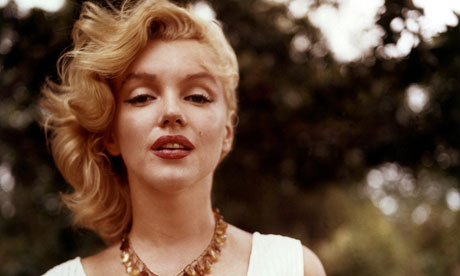
Lara Feigel:Reynolds and Byron were two of the first artists to court contemporary recognition as much as posterity, stage-managing their lives as art. Both conferred celebrity in their turn. The 18th-century would-be starlet was well advised to be painted by Reynolds or, better still, to become his mistress. Her 19th-century successor could have her sexual escapades catalogued in the verse of Lord Byron, who created a public persona mingling life and work. "Confess, confess, you dog," Byron urged a friend reading Don Juan. "It may be profligate but is it not life… Could any man have written it who has not lived in the world? – and fooled in a post-chaise?... against a wall? – on a table? – and under it?"
…But why should we need more of this satisfaction than previous generations? Public interest in the famous is particularly insatiable today; consider the proliferation of celebrity magazines and TV shows and the celebrity news in daily papers. Part of a plausible theory is that celebrities play a crucial role in our collective emotional lives by committing acts that the rest of us can view with disapproval. We have been cut loose, for excellent reasons, from the everyday hatreds that children learned from their parents and their peers. But moral disapproval is a muscle we are always anxious to flex; and now the moral playground on which most people once lived has become severely constricted. Mel Gibson, Tiger Woods and many others provide essential substitutes.So great is our need for detestable celebrities that we must constantly produce more, to replace those who die, grow tiresome or vanish into rehab….

Marlene Dietrich. Edward Steichen. In Italy, Goethe was introduced to the erotic world Faust encounters in Helen of Troy. Helen embodies the same ideal of physical beauty and Mediterranean passion Goethe identifies with the "Goddess Opportunity"
The essential romantic experience was the shipwreck; Goethe became close to being shipwrecked returning from Sicily in 1787 when his vessel drifted into the currents off Capri and seemed headed for destruction on the cliffs. Of course captain and crew managed to avert disaster but there was something strangely familiar about the episode. It has the the feeling of a set piece or an operatic ensemble. Indeed, the Mediterranean shipwreck scene is almost obligatory as an initiation of the romantic traveler , not only because he envies Ulysses, forever storm tossed into the arms of waiting women, but because tempests are in complete accord with his whole “Weltanschauung” , and life, like the sea, is faraught with Scyllas and Charybdises.
The real beneficiary of Goethe’s Mediterranean experiences was “Faust” , the most important book of the romantic age. many of the main themes and ideas of “Faust” can be traced back to the year and a half Goethe spent in Italy. Indeed the very voyage of discovery on which faust sets out, and for which he mortgages his soul to Mephistopheles, an early form of fly now, pay later, is metaphorically related to Goethe’s own voyage of self-discovery.
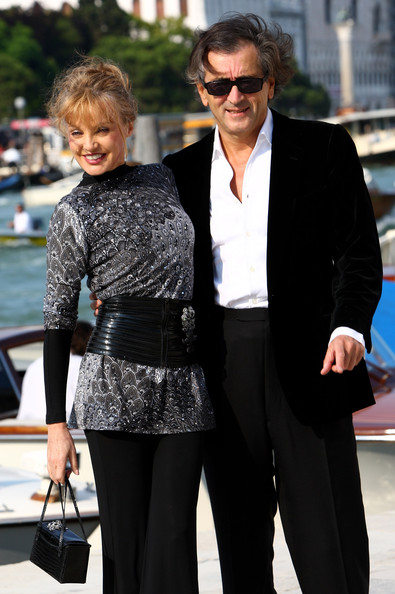
Arielle Dombasle & Bernard Henri-Levy "Academics today are required to be popular: new funding criteria for universities measure the "impact" of their staff. What better way for academics to generate star-status than to direct their scholarly labours to the stars themselves? In the past few years we've had Chris Rojek's Celebrity, a sociological analysis of the rites and semantics of fame; Stephen Gundle's Glamour: A History, which tours the celebrity landscape of the past two centuries; and Tom Payne's Fame: From the Bronze Age to Britney, which goes even further back, seeing Britney and Jordan as the successors to the cows and goats sacrificed in Athenian temples." ( Laura Feigel )
…Fred Inglis, fairly level headed most of the time, works himself into a boiling cauldron on the subject of Arthur Miller and Marilyn Monroe. He’s repelled by Miller’s complacent response to the news of his ex-wife’s suicide (“It had to happen”) and finds “still more inexcusable” his use of Monroe’s neurosis to prove his own innocence in an autobiographical play, After the Fall.
In Inglis’s eyes the true celebrities of this era are the rockers who draw crowds of 100,000 to stadiums in places like Rio de Janeiro, then bathe these great masses of sweating humans in a communal work of art as stylized as the ancient Noh dramas of Japan. “The tiny figures under the huge lights … are the single most compelling image of celebrity of our time,” he argues. They are rascals, some of them, perhaps worse than that, but they recall Byron and Wagner and even Tolstoy in their ability to bring their audiences together in a celebration of our common humanity — and satisfy, of course, our profound need to judge….
The great Faustian, romantic conflict of the divided self-“two souls live, ach! within my breast…” – is spelled out in some pages of prose Goethe wrote in naples:” Man is an extraordinarily complex being, in whose nature absolutely contradictory elements co-exist, the physical and the spiritual , the possible and the impossible, the attractive and the repellent, the bounded and the unbounded.”
This is a very modern view of the psyche , and one of the reasons Freud considered Goethe, along with Blake, as one of the forerunners of psychoanalysis. Yet the “Faust” story hinges on the Gothic idea that great knowledge leads to great sin, and that blind faith is the road to salvation- a contradiction Goethe never resolved but simply bypassed by treating this Christian subjectin a thoroughly Pagan way. His hero indulges the flesh and never repents, just as Goethe suggests he himself would cheerfully have bargained his soul for that one moment of which he could say, “Remain thou, thou art so beautiful!”
a





 COMMENTS
COMMENTS
Human brain is the most complex structure evolved on this planet; human behavior, that depends upon that brain, is consequently complex; humans are motivated by several motives at the same time, some of them in conflict. That conflict you wrote about, do not remember now where, btw right and right, is terrible. I have known it.
Relating sex symbols, Rodolfo Valentino said he knew his image was the canvas where women painted their dreams; impossible to say it better; at beginning of XXth Century women fell for tenors, now for actors; cute english boy Robert Pattinson is last one. Women are very prone to romantic dreams, at least many of them, and the sex symbol of the moment fullfill those dreams.
thanks for the comment. good point about how the romantic movement brought women into the marketplace as participants in romanticism which in turn was mutated into a commodification of dreams, symbols etc. as you pointed out. It was the lure so to speak.